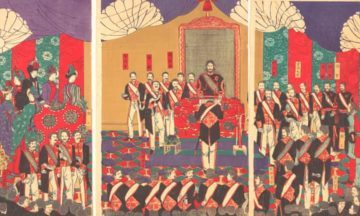Miles Taylor in The Guardian:
 Few documents are venerated as much as the American constitution. Until recently, one million people a year filed past the original copy on display in the Rotunda for the Charters of Freedom in Washington DC. Yet, as Linda Colley’s brilliant new book shows, viewing constitutions as national tablets of stone tells us more about their contemporary charisma than the complex histories from which they were wrought. In this compelling study of constitutions produced around the world between the mid-18th century and the outbreak of the first world war, she upends the familiar version of history at every turn. Out goes the myth that constitutions were the product of democratic aspirations or revolution – rather they arose from the ashes of war or the threat of invasion. Nations may have been girded by constitutional documents, but these were borderless texts, available for adaptation across time and space. Above all, constitutions were “protean and volatile pieces of technology” that travelled far and wide, assisted by the expansion of print media and the speeding-up of long-distance travel and communication.
Few documents are venerated as much as the American constitution. Until recently, one million people a year filed past the original copy on display in the Rotunda for the Charters of Freedom in Washington DC. Yet, as Linda Colley’s brilliant new book shows, viewing constitutions as national tablets of stone tells us more about their contemporary charisma than the complex histories from which they were wrought. In this compelling study of constitutions produced around the world between the mid-18th century and the outbreak of the first world war, she upends the familiar version of history at every turn. Out goes the myth that constitutions were the product of democratic aspirations or revolution – rather they arose from the ashes of war or the threat of invasion. Nations may have been girded by constitutional documents, but these were borderless texts, available for adaptation across time and space. Above all, constitutions were “protean and volatile pieces of technology” that travelled far and wide, assisted by the expansion of print media and the speeding-up of long-distance travel and communication.
The Gun, the Ship and the Pen begins its journey, not where one might expect – in the America of the founding fathers or in revolutionary France – but in Corsica in 1755 where a former soldier, Pasquale Paoli, drew up a 10-page constitution for the island. Such military men crop up throughout the book as unlikely draftsmen of political order. In a series of vivid portraits we come across Toussaint Louverture in Haiti, Napoleon Bonaparte in France and Simón Bolívar in South America. This preponderance of the soldier-legislator provides Colley with one of her main themes: the combination of sword and pen – might and right – in the making of constitutions.
An array of statistical and descriptive evidence demonstrates how so many constitutions that built the modern world were forged during two eras of intense warfare at sea and on land. These were the Seven Years’ War of 1756-63 and its aftermath, and the wars of the great powers in the long 1860s (the American civil war, the wars of unification in Italy and Germany, and the European and American incursions into China and Japan).
More here.
